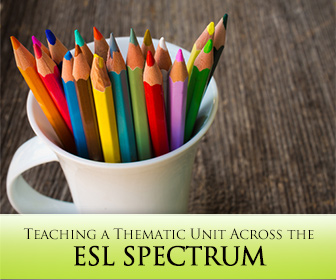Where Does It All Come from? 5 Easy Ways to Develop a Vocabulary Unit from Scratch


Reading, writing, grammar, listening and speaking have all been distinct classes. In these types of programs, having continuity and connection between classes can be difficult. One solution is teaching a thematic unit in all of those classes. It’s not as complicated as you might think, and it works really well if you teach all the classes or if you have good communication with those who teach the other classes. Planning and carrying out this type of unit is easy, too. Just follow these steps.

The first step in creating a cross curricular unit is determining what your students already know about a topic. Most ESL classes are made up of people from different backgrounds. Consequently, you students will know different things about any topic you choose for your thematic unit. Start your unit by asking students to brainstorm any vocabulary they know that is associated with the topic. You might also consider using a vocabulary web as you write down, on the board, the words your students know and, perhaps, use.
Then have your students work in groups of three to determine what they would still like to know about this. This activity will serve two purposes. First, your students will get speaking practice. Students will have a chance to ask questions and get clarification from their fellow students. Second, you will have a better idea of what interests your students. If possible, design the rest of your unit around what your students want to know. They will be more engaged and learn more easily when they are interested in the topic. Once you decide on the subtopics you will teach, determine what materials you will need and the additional vocabulary your students will have to learn.
For example, say you wanted to do a unit on music. You spend some time with your students determining what musical vocabulary they already know and what they would like to know about the topic. They may be interested in professional music careers in the U.S., music education in U.S. schools, or the music entertainment industry. Based on this, you can determine what topics within music you will cover with your students. You may even try to touch on all of them in different subject areas.
Reading is usually an easy place to include realia in the classroom. If you read the newspaper or get your news online, keep your eyes open for any articles related to your topic. You can start collecting them several months in advance. Then use these articles for your students’ reading assignments while teaching the reading skills your students need. You can have them read for the main idea, read for details, write summaries, or do any other assignments you typically give in reading class.
You can also have your students bring in articles that interest them. It’s a good opportunity for them to present the information the class and give them some additional speaking practice. Also, having students write summaries of their articles and then posting them in your classroom gives the rest of your students a chance to read independently and learn more about the topic. Of if you rather, make copies of each summary for the entire class to read or reference as you see fit.
Articles aren’t the only way to bring realia into your classroom. Collect any items related to your topic that your students can read. And these items don’t have to come on sheets of paper. For the music example, I might include CD cases, album reviews, concert programs, or song lyrics in my reading materials.
If your students are looking for more of a reading challenge, try assigning a short story or novel related to your topic. Many publishers offer simplified versions of popular novels suited to ESL students or consult a short story index to find smaller pieces of fiction related to your topic.
Writing classes are often tied very closely to reading classes, and you can use your reading materials as a starting point for many writing assignments. Writing summaries is always good, but you can integrate writing assignments into your unit in plenty of other ways. Try writing letters with your students to someone in the industry. A research paper is another way to connect class goals with what your students are interested in learning. Simple as well as complex essays can tie in, too, depending on what topic you are studying.
For my music unit, I might have students write a letter to a music label asking for information about upcoming projects or what types of bands they are interested in. Students could also write a letter of recommendation to the school district suggesting improvements to the current music education program. With the right group of students, I might even have them write a process essay which outlines how to write a song, learn an instrument, or download digital music files.
For my listening classes, I always try giving my students a chance to listen to different voices and speaking styles. Though listening to native speakers is challenging, I think it’s important for students to use the language that they know in creative ways to make communication happen, even if they don’t know every word or grammatical structure in perfect spoken English. Because of this, I design listening activities to bring my students into contact with native speakers. Surveys are a great way to do this. I send my students out in pairs or groups of three to talk to native speakers and ask a few questions. With the questions on paper in front of them, these conversations are less intimidating, and students are usually able to get good information from their survey takers.
Guest speakers are another great way to giving your students authentic listening practice. The more connections you have, the more likely you will know someone who can speak intelligently about the topic your students are studying. Another option is inviting another class as conversation partners. If possible, make sure the other class has some connection to your topic.
For a unit on music, I might invite a music teacher, a music blogger, or someone in a garage band to come talk to my class. Or I might invite the concert band from my local high school or college. My students get het opportunity to listen to someone other than me, and my guests get to talk about something they love.
If you have the time and the resources, field trips are another way to give your students good listening practice. Depending on where you teach, you may have several free resources available for fieldtrips. For a music unit, I love taking my students to a fine arts school tour or on a tour of a local music venue. It’s free advertising for the school or theater and great listening practice for my students.
Grammar is probably the toughest area to include in a cross-curricular unit, but it’s not impossible. I ask myself what my students will need to say or what structures they will need to know to accomplish the goals related to this unit. If they will be writing letters, I might include modal verbs or the conditional tense in my grammar plans. If they will be discussing their past experiences, I may include a review of past tenses. If I can’t make connections this way, I know my in class examples or homework assignments can tie in to whatever topic we are studying. In a lesson on the simple past, for example, I might describe a concert I attended using the past tense.
Cross-curricular thematic units usually mean more work than opening up a book and tackling the next chapter, but they are worth the effort it takes to make them happen. If you are thinking about doing a thematic unit with your student, you might want to try music, education, sports, or food and see what happens.
What topic do you use?